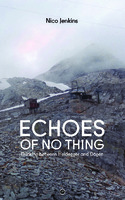Echoes of No Thing: Thinking between Heidegger and Dōgen
Author(s)
Jenkins, Nico
Collection
ScholarLedLanguage
EnglishAbstract
Echoes of No Thing seeks to understand the space between thinking which Martin Heidegger and the 13th-century Zen patriarch Eihei Dōgen explore in their writing and teachings. Heidegger most clearly attempts this in Contributions to Philosophy (of the Event) and Dōgen in his Shōbōgenzō, a collection of fascicles which he compiled in his lifetime. Both thinkers draw us towards thinking, instead of merely defining systems of thought. Both Heidegger and Dōgen imagine possibilities not apparent in the world we currently inhabit, but notably, find possible, through a refashioning of thinking as a soteriological reimagining that clears space for the presencing of an authentic experience in the space which emerges between certainties. Jenkins elucidates this soteriological reimagining through a close reading of both authors’ conceptions of time and space, and by developing a practice of listening that is attuned to the echoes that resonate between the two thinkers. While Heidegger often wrote about new beginnings (as well as about gathering oneself, preparing the site, clearings, and practicing) in preparation for the evental un-concealing of truth, nowhere is this as present as in the enigmatic, difficult, and in fact beautiful, Contributions. To call a text beautiful, especially a work of philosophy, risks committing an act of disingenuity, and yet Contributions, like Jacques Derrida’s Glas or Walter Benjamin’s unfinished Arcades Project, rises to this acclaim through its very resistance to a system, its refusal to be easily digested, or even understood. Contributions is unfinished, partial, even at times muttered; it is the beginning of a thinking which takes place on a path and as such cannot imagine—or refuse—its final destination. It invites us to take up towards, but not to insist on, its thinking; it is a “turn” away from the reason and logic of a technologized world and returns philosophy—as a thinking—to a place of wonder and awe. Dōgen’s Shōbogenzō, from another culture and time entirely, is also a beautiful text, for similar reasons. The Shōbogenzō, gathered first as a series of talks given by Eihei Dōgen (and later composed as written texts) details the process of understanding which leads, for Dōgen, to a position of pure seeing, or satori, and yet these talks are not simply rules for monks, nor merely imprecations and demands for a laity; rather, they open a being’s thinking to the possibility of something purely other and work as a transition across worlds that also opens us to an other world. What both thinkers illustrate, as do the other thinkers drawn on in this project—most notably, those philosophers associated with the Kyoto School, who were both intimately aware of Dōgen’s work, and studied, or studied with, Heidegger—is that world is not a fixed, stable entity; rather it is a fugal composition of possibility, of as yet untraversed—and at times un-traversable—spaces. Echoes of No Thing seeks to examine, within the lacunal eddies of be-coming’s arrival, that space between which both thinkers point towards as possible sites of new beginnings.
Keywords
Asian philosophy; Eihei Dōgen; Martin Heidegger; continental philosophy; comparative philosophy; Zen BuddhismDOI
10.21983/P3.0239.1.00ISBN
97819501920201, 9781950192014OCN
1100490307Publisher
punctum booksPublisher website
https://punctumbooks.com/Publication date and place
Brooklyn, NY, 2019Classification
East Asian and Indian philosophy


 Download
Download